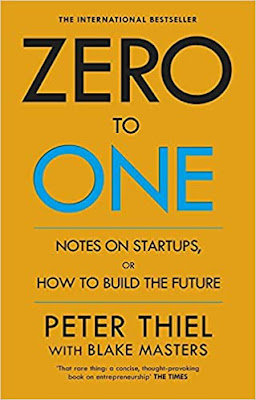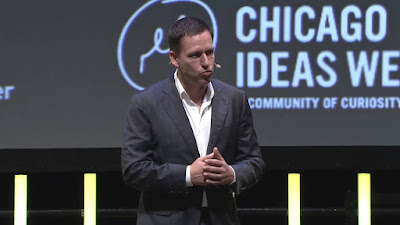Focus on Monopoly: Thiel emphasizes the importance of creating a monopoly in your market rather than competing in crowded and competitive industries. A monopoly allows you to capture significant value and fend off competitors. Google's search engine dominance, with over 90% of the market share, gives it a virtual monopoly in online search. Microsoft's Windows operating system had a near-monopoly on personal computer operating systems during the 1990s and early 2000s, giving it immense power in the technology industry.
Start from Zero to One: Thiel encourages entrepreneurs to create new, innovative products or services that didn't exist before, moving from "zero to one" instead of simply copying existing ideas ("1 to n"). Tesla's electric cars disrupted the traditional automotive industry, introducing an innovative product with significant market impact. Airbnb's platform pioneered the concept of "home-sharing," allowing homeowners to rent out their properties to travelers, creating an entirely new market in the hospitality industry.
The Power of Technology: Embrace technological progress and use it as a catalyst for innovation and growth. Technology allows for rapid advancements and scalability. SpaceX's groundbreaking work in reusable rocket technology has revolutionized space travel and brought down the cost of launching payloads into space. Amazon's utilization of advanced robotics and automation in its warehouses has significantly improved efficiency and shortened delivery times.
Aim for Big, Bold Visions: Don't be afraid to think big and have ambitious, audacious goals. Such visions inspire people and attract the best talent to your company. Google's mission to "organize the world's information and make it universally accessible and useful" has guided its development of numerous products and services with a global impact. Netflix's vision of becoming the leading global entertainment streaming service drove its expansion to nearly every country, reshaping how people consume content worldwide.
Lean and Agile Startups: Start small, stay nimble, and iterate quickly based on customer feedback. Being agile allows you to adapt to changing circumstances and refine your product or service. The development of the lean startup methodology, as popularized by Eric Ries, emphasizes iterative learning and product refinement through rapid experimentation. Dropbox's early strategy of launching a simple minimum viable product (MVP) and refining it based on user feedback played a key role in its rapid growth.
Sales and Distribution Matter: No matter how groundbreaking your product, it won't succeed without effective sales and distribution strategies to reach your target market. Amazon's relentless focus on logistics and distribution has been a key factor in its dominance of the e-commerce industry. Coca-Cola's successful global distribution network and marketing campaigns have made it one of the world's most recognized and valuable brands.
Value Propagation: Create a product or service that generates its value and spreads organically through positive network effects and user engagement. Facebook's social network relies on value propagation, where more users attract more users, creating a self-reinforcing network effect. The growth of the payment platform PayPal was fueled by its ability to attract both buyers and sellers, creating a virtuous cycle of increased user adoption.
Secrets and Contrarian Thinking: Seek out hidden information or contrarian views that others may not be aware of, providing a competitive advantage. Google's PageRank algorithm, which was based on the idea of using the links between web pages as a measure of their importance, was a well-kept secret that fueled its early success. Apple's investment in developing proprietary processors for its devices allowed it to differentiate its products and maintain a competitive edge over rivals.
Founding Team and Culture: The right founding team and a strong company culture are crucial to a startup's success. Surround yourself with talented individuals who share your vision. Apple's early success was partly attributed to the collaboration between Steve Jobs and Steve Wozniak, who complemented each other's strengths. Google's co-founders, Larry Page and Sergey Brin, formed a powerful partnership with complementary skills and a shared vision for the future of the internet.
Long-Term Thinking: Focus on sustainable growth and long-term goals rather than short-term gains. Be patient and persistent in building a valuable company. Amazon's founder, eff BezosJ, has been known for his long-term vision, willingness to reinvest profits, and commitment to customer satisfaction. Warren Buffett, the renowned investor, built his wealth through patient, long-term investments and holding companies for the long haul.
Related Posts:
1. TOP ELEVEN LESSONS FROM THE BOOK ""THE UNDERCOVER ECONOMIST" BY TIM HARFORD
2. TOP 12 ESSENTIAL STEPS TO LAND A JOB IN LONDON'S THRIVING BANKING SECTOR
3. TOP TEN IDEAS FROM THE BOOK "THINK & GROW RICH" BY NAPOLEON HILL
5. THE FIRST MOVER ADVANTAGE IN ARTIFICIAL INTELLIGENCE: PAVING THE WAY FOR INNOVATION
Other Related Posts:
1. TOP DISADVANTAGES OF INHERITANCE TAX IN THE UNITED KINGDOM AND IT'S IMPACT ON WEALTH CREATION
3. THE IMPACT OF INFLATION ON THE CREATION OF WEALTH: NAVIGATING A CHANGING FINANCIAL LANDSCAPE
4. THE POTENTIAL OF WEALTH GENERATION THROUGH INVESTING IN EMERGING MARKET BONDS
5. TOP IDEAS TO CONSIDER IN ORDER TO MAKE MONEY WITH STOCKS AND SHARES





Comments
Post a Comment
Thanks for leaving comments. You are making this discussion richer and more beneficial to everyone. Do not hold back.